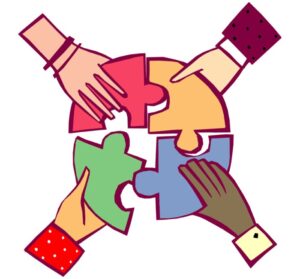Soft skills play a crucial role in consistently achieving excellence in various aspects of life such as business, relationships, leadership, and daily interactions. These skills help to present oneself professionally, make a lasting impact, and stand out. They are needed in every interaction, whether it’s speaking, posture, or everyday conversations. In the workplace, soft skills enhance technical proficiency by preventing interpersonal conflicts, internal struggles, and negative public and market perceptions. The importance of these skills has garnered widespread attention in various organizations due to their proven impact. Unlike technical skills, soft skills are not about perfection, but rather about being human. Communication is often the determining factor in building strong relationships both at home and in the workplace. Developing soft skills fosters personal growth, learning, and success in the workplace.
As technology advances and electronic communication becomes faster, easier, and more prevalent, the need for strong personal connections may seem to be declining. However, soft skills are still necessary to infuse a human touch into these digital interactions and make them feel like face-to-face exchanges, essential for business longevity. Despite the convenience of technology, there is no replacement for genuine in-person interactions that promote clarity and understanding. Today, soft skills are even more critical for businesses and communities than hard skills, as they determine success and advancement.
McKinsey & Co, (n.d) explain soft skills as non-technical skills that enable someone to interact effectively and harmoniously with others, are vital to organisations and can impact culture, mindsets, leadership, attitudes and behaviours. These skills fall into the following categories:
- Advanced communication and negotiation skills
- Interpersonal skills and empathy
- Leadership and management skills
- Entrepreneurship and initiative-taking
- Adaptability and continuous learning skills
- Teaching and training skills
According to a McKinsey survey, reskilling significant portions of the workforce within the next 5-10 years will be required-tens of millions of mid-career, middle-age workers, particularly in advanced economies-with the development of soft skills a key element.

Each and every one has a strong set of soft skills that they can put to good use in their workplace. Are you aware of the soft skills set which are your strengths? These are some strong soft skills I teach at my Soft Skills University:
- Anticipation: Rejection is inevitable in life, no matter where you are. It’s essential to keep this in mind when dealing with people and in all aspects of life. When faced with rejection, avoid responding with vulnerability or emotion. Relationships are more critical than contracts in business, so always anticipate and proactively address issues rather than reacting to them.
- Attraction: Reliability as a worker or employer is largely determined by the “connectivity, likeability, respectability, and credibility” factor. This is not based on physical appearance but on the image you project. To do business with someone, people must first connect with, like, respect, and trust that person. When these four pillars are in place, people will be more open to other offerings. It’s important to remember that as an entrepreneur, you are the product of your business, and as an employee, you represent the organization you work for.
- Introduction: The way you introduce yourself, both to the market and those you work with, is crucial. Your interaction style, including speech and body language, should align with your internal stakeholders and clearly define your identity to your team. Your introduction sets the tone for how others perceive you.
- Engagement: communication in the workplace cannot be emphasized enough. Your engagement comes from your appearance – visual, your behaviour – etiquette, communication – the things you speak about and your digital footprint.
Soft skills can be developed in a variety of settings, not just in the workplace. They are essential in daily interactions with family, friends, clients, colleagues, superiors, business partners, and even strangers. Improving our soft skills should be a priority. The methods of developing soft skills vary, especially in a workplace environment.
According to Forbes, coaching is often used to improve an individual’s soft skills, such as self-awareness, communication, and emotional intelligence. Studies have shown that coaching is effective in enhancing an individual’s career success and performance. The most successful coaching interventions use 360-degree feedback and internal coaches. The number of sessions or whether they are virtual or in-person does not significantly impact the outcome. Research has also found that coaching improves coping skills, emotional well-being, and motivation. Feedback is a crucial tool that coaching provides, helping individuals identify their weaknesses and areas for improvement. This is especially important for soft skills, as there is only a 10% overlap between the skills people believe they have and the ones they actually possess (e.g. creativity, intelligence, EQ, etc.).

Isspringsolutions also mentions that another effective yet simple way of developing soft skills is Peer (social) learning – to learn with other people. Research has shown there is a significant link between having fun in the workplace and informal learning. For example, launch a peer forum where employees will discuss soft skills in the workplace and how to achieve their full potential. They will have a place to ask questions and share stories to get peer – based feedback. For instance, an employee encountered a particularly difficult customer who got on his or her nerves. He or she can share his or her experience on the forum, discuss it with colleagues, and get useful advice for the future.
Here are some four soft skills that matter:
- CLARITY
This is saying and communicating by firstly preparing in your mind what you do not stand for, what you will not do and where you will not be. When you filter out what you do not want in your life, you are very clear as to where you are going. Identify what you will not do, where you will not go and what you do not stand for. This will help you make way for all the possibilities. The biggest fighter of your clarity is your generality. The very moment you are general about what you want to do you lose business clients.
2. CURIOUSITY
The industry you are working in is not new; this applies also to the business you have started or about to start. It has people who have been there or doing it for years. Have you ever heard of the phrase, “Don’t reinvent the wheel?” That is actually true. Whichever workspace you find yourself, people have been in it before, some are still in it and others are now going for it. The key thing is to be curious and ask questions. Be adventurous and question everybody – from the topmost person to the janitor. Your knowledge about the industry is good; but it is what you know that affects the industry that matters most. This is because, it is that which will give you the skill to sell for your organisation or bring solutions that will uplift it.
3. COMMONALITY
Companies or organisations do not necessarily look for achievement, they look out for alignment. When you are hired, employers want to work with you because they think you have something as a person that they need. So find that alignment and, communicate that clearly and consistently through your work and your relationship with the people you work with.
4. POSITIONINING
You must always position yourself in a way and in a space where people will like you from the onset – for instance your appearance and body language. Nature Neuroscience Journal has shown people make a decision to deal with you within 3 – 7 seconds of meeting you. This makes your positioning a very important soft skill to hone in the workplace.
The key to making our work easy, enjoyable and be rewarded for it is through the right use of our soft skills. We must make it part of our goals to learn the ones we do not have by observation and practice so that we can become versatile no matter the level in the work ladder that we find ourselves. Always remember, soft skills matter!
Unleash Your Potential! Attend our Soft Skills Summit and unlock the secrets to success in today’s workplace. Register now and embark on your journey to realizing your full potential.
Are you ready for TRANSFORMATION?
Dzigbordi K. Dosoo: The H.E.L.P. Coach
Dzigbordi K. Dosoo is a Soft Skills Expert, Personal Impact, Professional Growth and Influence Expert specialising in Humanness, Entrepreneurship, Leadership and Power – H.E.L.P.
A career spanning over two decades, she has established herself as a Certified High Performance Coach, Speaker, Author, Wellness Expert and award-winning Entrepreneur with a clientele ranging from C-Suite Executives, Senior Management, Practitioners and Sales Leaders spanning 3 continents.
She can be reached on [email protected] and @dzigbordikwaku across all social media platforms.











